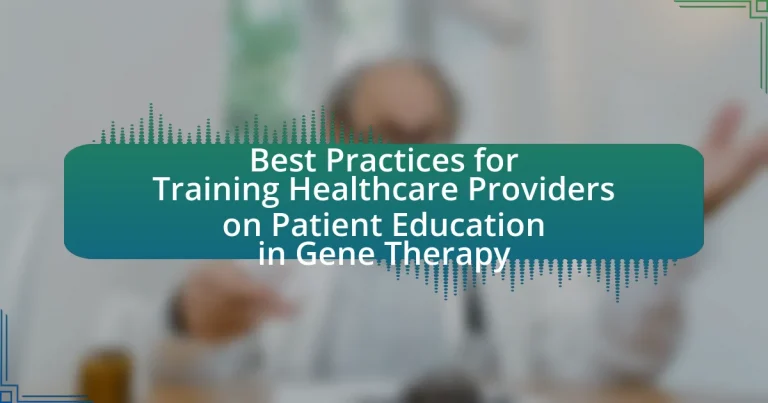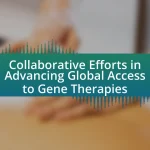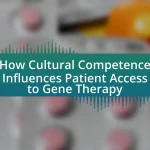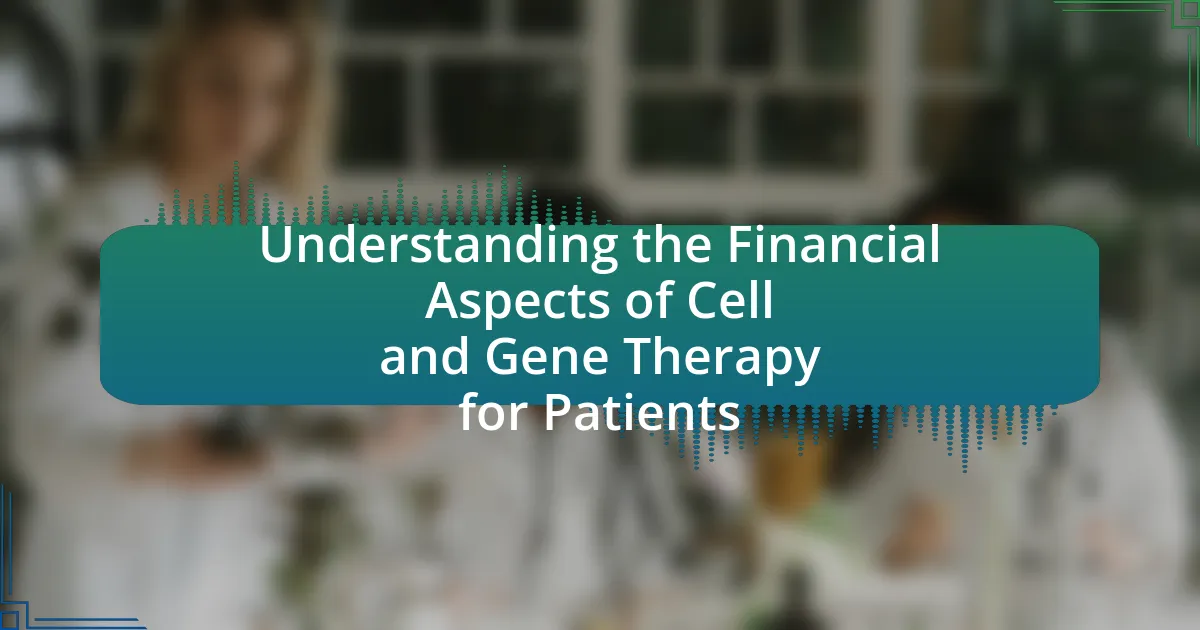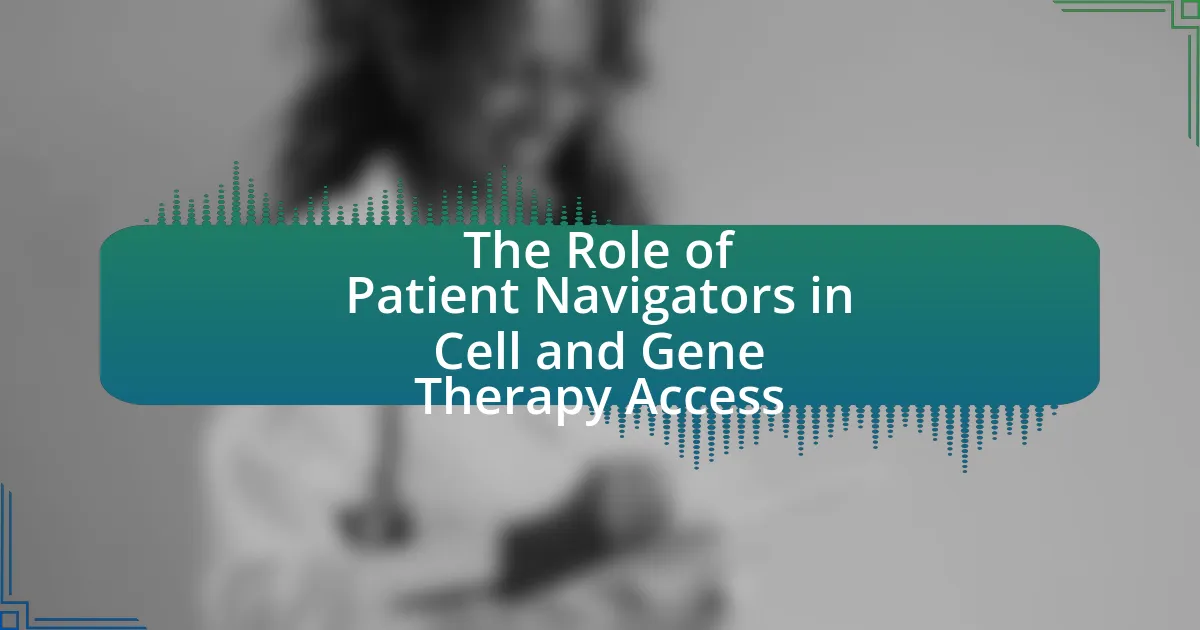The article focuses on best practices for training healthcare providers in patient education related to gene therapy. It emphasizes the importance of comprehensive curriculum development, interactive training methods, and ongoing assessment to enhance provider knowledge and patient outcomes. Key challenges faced by providers include the complexity of gene therapy concepts and the need for effective communication strategies. The article also highlights the role of patient education in improving treatment adherence and health outcomes, while outlining essential knowledge areas and training components necessary for effective provider education in this rapidly evolving field.
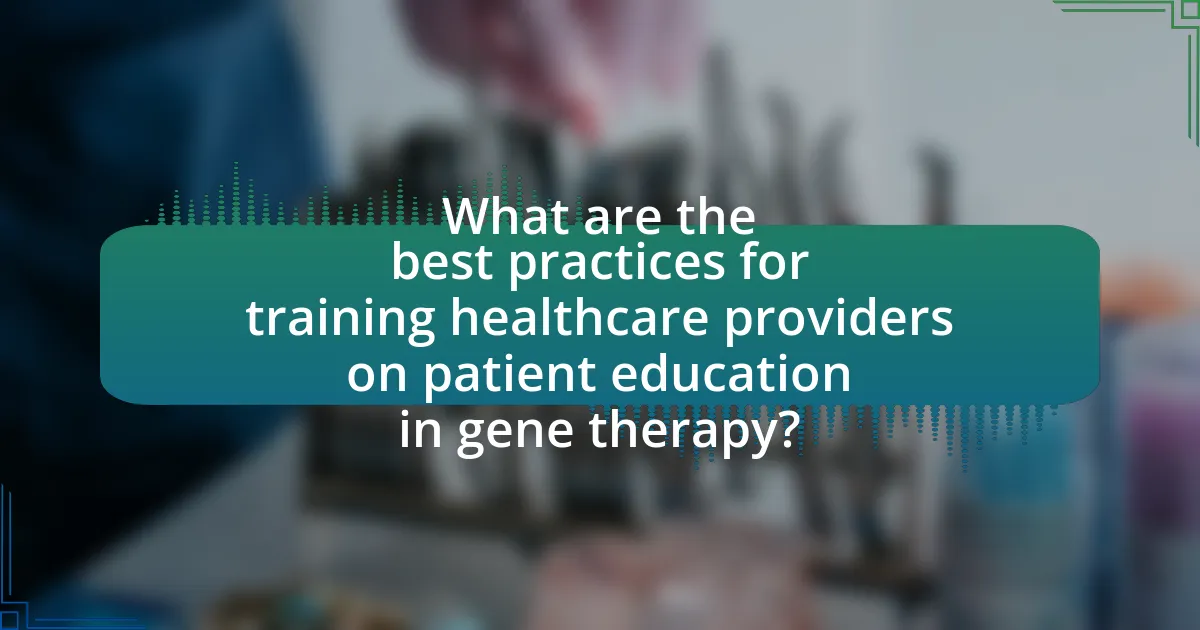
What are the best practices for training healthcare providers on patient education in gene therapy?
The best practices for training healthcare providers on patient education in gene therapy include comprehensive curriculum development, interactive training methods, and ongoing assessment of knowledge. Comprehensive curriculum development ensures that healthcare providers receive in-depth knowledge about gene therapy, including its mechanisms, benefits, risks, and ethical considerations. Interactive training methods, such as simulations and role-playing, enhance engagement and retention of information, allowing providers to practice communication skills in real-world scenarios. Ongoing assessment of knowledge through quizzes and feedback sessions helps identify areas for improvement and reinforces learning. Research indicates that effective training programs lead to better patient outcomes and increased provider confidence in discussing complex topics like gene therapy.
Why is patient education important in gene therapy?
Patient education is crucial in gene therapy because it empowers patients to understand their treatment options, potential risks, and benefits, leading to informed decision-making. Educated patients are more likely to adhere to treatment protocols, which can enhance therapeutic outcomes. Studies indicate that when patients are well-informed, they experience reduced anxiety and improved satisfaction with their care, ultimately contributing to better health results. For instance, a survey published in the Journal of Genetic Counseling found that patients who received comprehensive education about gene therapy reported a 30% increase in treatment adherence compared to those who did not receive such education.
What challenges do healthcare providers face in educating patients about gene therapy?
Healthcare providers face significant challenges in educating patients about gene therapy, primarily due to the complexity of the subject matter and varying levels of patient understanding. The intricate scientific concepts involved in gene therapy, such as genetic modification and molecular biology, can be difficult for patients to grasp, leading to misconceptions and confusion. Additionally, the rapid pace of advancements in gene therapy creates a knowledge gap, as healthcare providers may struggle to stay updated with the latest research and treatment options. A study published in the Journal of Genetic Counseling highlights that 60% of healthcare providers feel inadequately trained to discuss gene therapy with patients, indicating a need for improved educational resources and training programs. Furthermore, emotional factors, such as fear and anxiety about potential risks and outcomes, can hinder effective communication, making it challenging for providers to convey essential information clearly and empathetically.
How does effective patient education impact treatment outcomes in gene therapy?
Effective patient education significantly enhances treatment outcomes in gene therapy by ensuring patients understand their condition, the therapy process, and potential side effects. When patients are well-informed, they are more likely to adhere to treatment protocols, which can lead to improved efficacy of the therapy. Studies have shown that patients who receive comprehensive education about gene therapy exhibit higher levels of treatment compliance, resulting in better clinical outcomes. For instance, a study published in the journal “Molecular Therapy” indicated that informed patients demonstrated a 30% increase in adherence to prescribed gene therapy regimens compared to those with limited understanding. This correlation underscores the critical role of effective patient education in optimizing the benefits of gene therapy.
What key components should be included in training programs for healthcare providers?
Training programs for healthcare providers should include comprehensive content on gene therapy principles, patient communication skills, ethical considerations, and practical application of gene therapy techniques.
Gene therapy principles encompass the scientific basis, mechanisms of action, and types of gene therapies available, ensuring providers understand the underlying biology. Patient communication skills are essential for effectively conveying complex information to patients and their families, fostering informed decision-making. Ethical considerations must address consent, potential risks, and the implications of gene therapy, ensuring providers navigate these sensitive topics responsibly. Practical application involves hands-on training and case studies that allow providers to apply their knowledge in real-world scenarios, enhancing their confidence and competence in delivering patient education.
These components are supported by research indicating that effective training improves provider knowledge and patient outcomes, as seen in studies published in journals like “Genetics in Medicine,” which highlight the importance of structured educational programs in advancing healthcare practices.
What knowledge areas are essential for healthcare providers regarding gene therapy?
Healthcare providers must possess knowledge in several essential areas regarding gene therapy, including genetic principles, therapeutic mechanisms, ethical considerations, and patient communication strategies. Understanding genetic principles allows providers to comprehend the underlying biology of gene therapy, while knowledge of therapeutic mechanisms is crucial for explaining how these treatments work. Ethical considerations are vital for navigating the complexities of consent and patient rights, and effective patient communication strategies ensure that healthcare providers can convey complex information clearly and empathetically. These knowledge areas are supported by guidelines from organizations such as the American Society of Gene & Cell Therapy, which emphasizes the importance of comprehensive education for healthcare professionals involved in gene therapy.
How can training programs incorporate patient-centered communication skills?
Training programs can incorporate patient-centered communication skills by integrating role-playing scenarios and simulations that reflect real patient interactions. These methods allow healthcare providers to practice active listening, empathy, and clear communication, which are essential for understanding patient needs and preferences. Research indicates that training that includes interactive components significantly enhances communication skills; for instance, a study published in the Journal of General Internal Medicine found that such training improved patient satisfaction scores by 20%. By embedding these techniques into the curriculum, training programs can effectively prepare healthcare providers to engage with patients in a more meaningful and effective manner.
How can training methods be optimized for healthcare providers?
Training methods for healthcare providers can be optimized by incorporating evidence-based practices, interactive learning, and continuous feedback mechanisms. Evidence-based practices ensure that training content is grounded in the latest research, enhancing the relevance and applicability of the information provided. Interactive learning, such as simulations and role-playing, engages healthcare providers more effectively, leading to improved retention of knowledge and skills. Continuous feedback mechanisms, including assessments and peer reviews, allow for real-time adjustments to training approaches, ensuring that the methods remain effective and aligned with the evolving needs of healthcare providers. These strategies collectively enhance the quality of training, ultimately improving patient education in gene therapy.
What role does simulation play in training healthcare providers for patient education?
Simulation plays a critical role in training healthcare providers for patient education by providing a realistic and interactive environment for practice. This method allows providers to engage in role-playing scenarios that mimic real-life patient interactions, enhancing their communication skills and understanding of patient needs. Research indicates that simulation-based training can improve healthcare providers’ confidence and competence in delivering complex information, such as that related to gene therapy. For instance, a study published in the Journal of Medical Education found that simulation training significantly increased the ability of healthcare providers to explain treatment options effectively to patients, leading to better patient comprehension and satisfaction.
How can technology enhance the training experience for healthcare providers?
Technology can enhance the training experience for healthcare providers by offering interactive simulations and virtual reality environments that replicate real-life clinical scenarios. These tools allow providers to practice skills and decision-making in a safe, controlled setting, leading to improved confidence and competence. Research indicates that simulation-based training can increase retention of knowledge and skills by up to 70%, as evidenced by a study published in the Journal of Medical Education, which found that healthcare professionals who engaged in simulation training demonstrated significantly better performance in clinical tasks compared to those who received traditional training methods.
What evaluation methods can be used to assess the effectiveness of training programs?
Evaluation methods to assess the effectiveness of training programs include pre- and post-training assessments, participant feedback surveys, and performance metrics. Pre- and post-training assessments measure knowledge or skill acquisition by comparing results before and after the training, providing quantitative data on learning outcomes. Participant feedback surveys gather qualitative insights on the training experience, allowing for adjustments based on learner perceptions. Performance metrics, such as patient outcomes or adherence to protocols, offer concrete evidence of the training’s impact on real-world applications, demonstrating the program’s effectiveness in improving healthcare provider competencies in gene therapy education.
How can feedback from patients inform the training of healthcare providers?
Feedback from patients can inform the training of healthcare providers by identifying gaps in communication and understanding regarding treatment options, including gene therapy. Patient feedback highlights specific areas where providers may lack clarity or empathy, enabling targeted training interventions. For instance, studies have shown that when patients express confusion about gene therapy processes, healthcare providers can adjust their educational approaches to enhance comprehension and support. This iterative feedback loop ensures that training programs are responsive to patient needs, ultimately improving the quality of care and patient satisfaction.
What metrics should be used to measure the success of patient education initiatives?
The metrics used to measure the success of patient education initiatives include patient knowledge retention, patient satisfaction scores, behavior change rates, and health outcomes. Patient knowledge retention can be assessed through pre- and post-education assessments, demonstrating the effectiveness of the educational content. Patient satisfaction scores, often gathered through surveys, reflect the perceived value and clarity of the education provided. Behavior change rates indicate how well patients apply the information learned, which can be tracked through follow-up assessments or adherence to treatment plans. Lastly, health outcomes, such as improved clinical markers or reduced hospitalizations, provide concrete evidence of the impact of education on patient health. These metrics collectively offer a comprehensive view of the effectiveness of patient education initiatives.
How can healthcare organizations support ongoing education for providers in gene therapy?
Healthcare organizations can support ongoing education for providers in gene therapy by implementing structured training programs that include workshops, online courses, and access to the latest research. These programs should focus on the evolving landscape of gene therapy, including new techniques, ethical considerations, and patient management strategies. For instance, the American Society of Gene & Cell Therapy offers resources and educational opportunities that keep healthcare providers informed about advancements in the field. Additionally, organizations can facilitate collaboration with academic institutions and industry experts to provide real-time updates and practical training, ensuring that providers are equipped with the necessary knowledge and skills to effectively educate patients about gene therapy options.
What resources are available for continuous learning in gene therapy?
Resources available for continuous learning in gene therapy include online courses, webinars, and professional organizations. Online platforms like Coursera and edX offer courses specifically focused on gene therapy, while organizations such as the American Society of Gene & Cell Therapy provide webinars and conferences that cover the latest advancements and best practices. Additionally, peer-reviewed journals like “Molecular Therapy” and “Gene Therapy” publish current research and reviews, serving as valuable resources for healthcare providers seeking to enhance their knowledge in this rapidly evolving field.
How can mentorship programs enhance the training of healthcare providers?
Mentorship programs enhance the training of healthcare providers by facilitating knowledge transfer and skill development through personalized guidance. These programs pair experienced professionals with less experienced providers, allowing for real-time feedback and support, which has been shown to improve clinical competencies and confidence. Research indicates that mentorship can lead to better patient outcomes, as providers who engage in mentorship are more likely to adopt best practices and stay updated on advancements in their field, including emerging therapies like gene therapy. For instance, a study published in the Journal of Medical Education found that mentorship significantly increased the clinical skills of participants, demonstrating the effectiveness of structured mentorship in healthcare training.
What are some practical tips for implementing best practices in training healthcare providers?
To implement best practices in training healthcare providers, organizations should focus on developing structured curricula that incorporate evidence-based guidelines and interactive learning methods. Structured curricula ensure that healthcare providers receive comprehensive training that covers the latest advancements in gene therapy, while interactive methods, such as simulations and role-playing, enhance engagement and retention of knowledge.
Additionally, ongoing assessment and feedback mechanisms should be established to evaluate the effectiveness of training programs. Research indicates that continuous feedback improves learning outcomes, as seen in a study published in the Journal of Continuing Education in the Health Professions, which found that regular assessments significantly enhance knowledge retention among healthcare professionals.
Furthermore, fostering a collaborative learning environment encourages knowledge sharing and peer support, which has been shown to improve the overall quality of patient education in gene therapy. By implementing these strategies, healthcare organizations can effectively train providers to deliver high-quality patient education.
